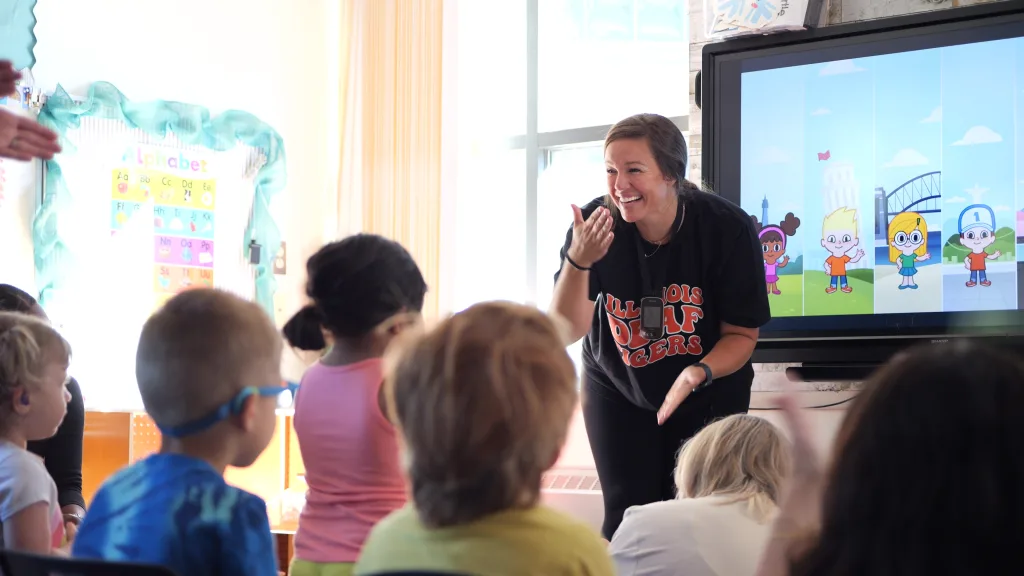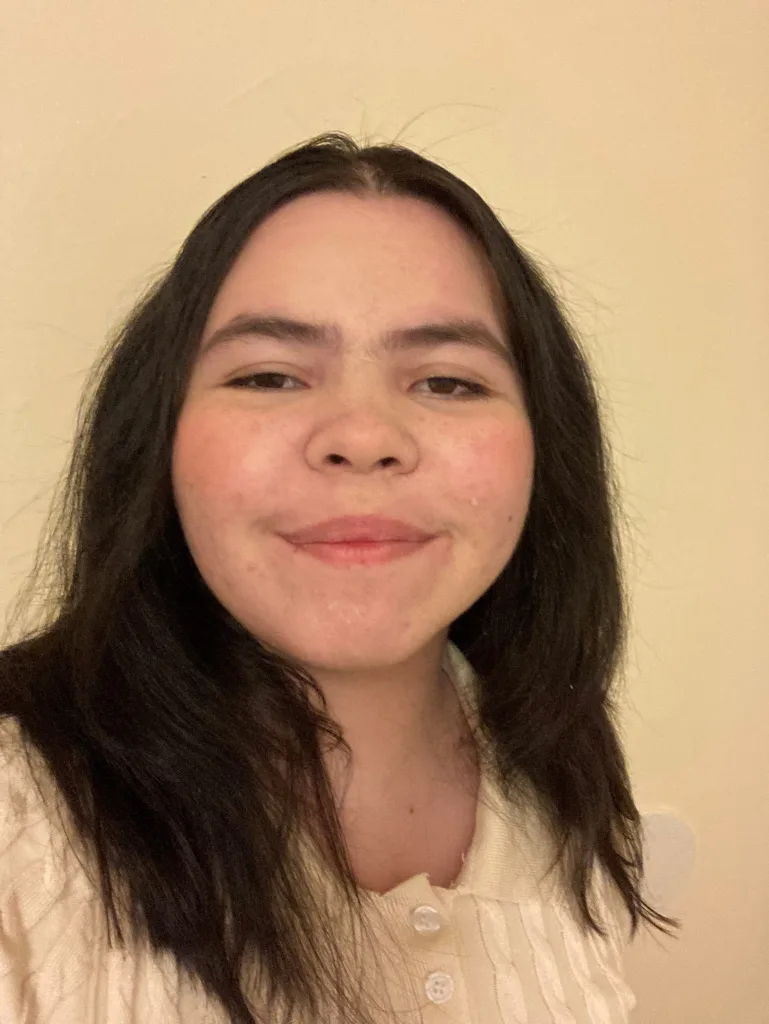Families Gain Expert Guidance and Support Network for Raising Children with Hearing Loss
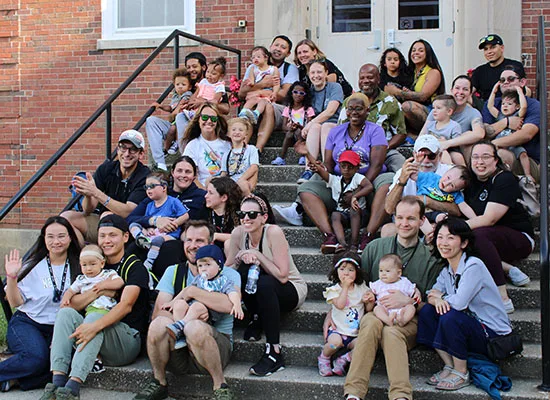
The 2024 Institute for Parents of Preschool Children Who Are Deaf or Hard of Hearing provided education and connection to 27 Illinois families.
Marcellus Weldon and his daughter, Mariana, were born with the same rare genetic disorder called Treacher Collins syndrome.
It affects the development of the head and face, including the ears.
“We don’t have any ear canal or any ear at all, on both sides. So, we’re profound to moderate deaf. It just happens at birth,” Marcellus explained.
He uses the analogy of a car to describe living with their disabilities.
“Growing up, I was the passenger, and my mother was the driver because she also has the same condition as me,” he said.
“Now that I’m the parent, I’m the driver and Mariana is the passenger. And we have to go through hills, valleys, twists and turns together. And there’s going to be things that I just can’t do with her.”
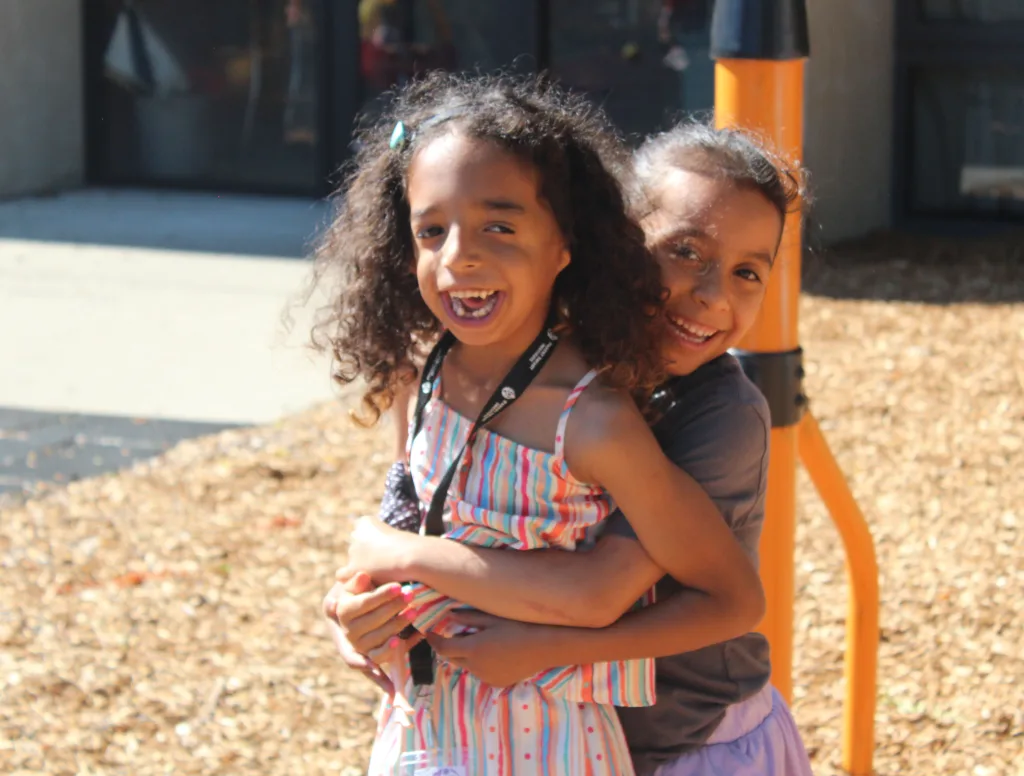
The desire to give Mariana, 6, the knowledge and tools necessary to be her own “driver” led the Weldon family to the 2024 Institute for Parents of Preschool Children Who Are Deaf or Hard of Hearing.
The Institute is a free, annual program for parents and caregivers of children ages 6 and under who have an identified hearing loss. It focuses on helping families find answers, build connections and access resources all in one place.
During the four-day program, Marcellus watched Mariana bond with other children. He also learned more about his family’s type of hearing loss, education options and how to best support Mariana through school and beyond.
“It’s nice for me to see her thrive not only academically but socially, and she’s just been blossoming like no other. And that’s a beautiful thing to see,” he said.
“She has a community. She has somewhere to go,” Marcellus continued. “She has resources that I never had — someone to fill up her tank, using that analogy.”
The Weldons were among 27 families from all over Illinois who attended this year’s Institute from June 13-16 on the Illinois School for the Deaf (ISD) campus in Jacksonville.
The University of Illinois Chicago’s Division of Specialized Care for Children (DSCC) supports the Institute, along with other sponsors.
“Parent Institute for me is exactly the soul and the heart of what DSCC’s mission is. You have our mission statement as partnering, helping and connecting. And this program is the epitome of what that is,” said Violet Wiker, DSCC’s Family Liaison who helps families enroll and prepare for the Institute.
Continue reading and watch the recap video below to for powerful parent and staff testimonials from the 2024 Institute:
Expert advice and guidance
The Institute provides valuable education and networking for children with hearing loss, their parents/caregivers and their siblings.
Participating parents and caregivers attend daily lectures by experts in the field to learn about raising a child with hearing loss. They also meet in small groups with professionals to discuss specific concerns and connect with other caregivers.
“They go through classes, they have educational experiences, they get to make friends that are people that are living their journeys and then interacting with the professionals that can give them great advice and guidance and expertise on how to go forward from here,” Violet said.
The children with hearing loss attend classrooms with experienced teachers of children who are deaf or hard of hearing. They play with one another and often develop deep friendships.
Each child also has the opportunity to receive hearing, vision, psychological, speech, language and educational evaluations.
“All of those are these amazing comprehensive reports that (families) can take with them out into their communities where they need those reports and those recommendations,” Violet said.
Siblings also attend and stay with their families in the ISD dorms. The siblings have their own teachers and take part in fun recreational activities.
“No one ever leaves disappointed and without fail, by the time we depart at the end after the graduation ceremony, people are always very grateful, glad that they came and they have taken away a lot of knowledge and information,” said Angela Kuhn. Angela is an ISD administrator who serves as the director for the Institute.
“They have really a connection with the staff here at the School for the Deaf and DSCC employees that lasts for a lifetime.”
“We understand each other”
Mayra Villarreal attended the Institute looking for knowledge, community and others who would understand her family’s situation.
Mayra’s daughter, Miliani “Mili” Carmona, 6, has a rare genetic mutation that causes progressive hearing loss. It also causes retinitis pigmentosa, a condition that affects the eyes and leads to gradual vision loss, as well as seizures and other neurological problems.
The Institute helped Mayra understand how Mili perceives the world.
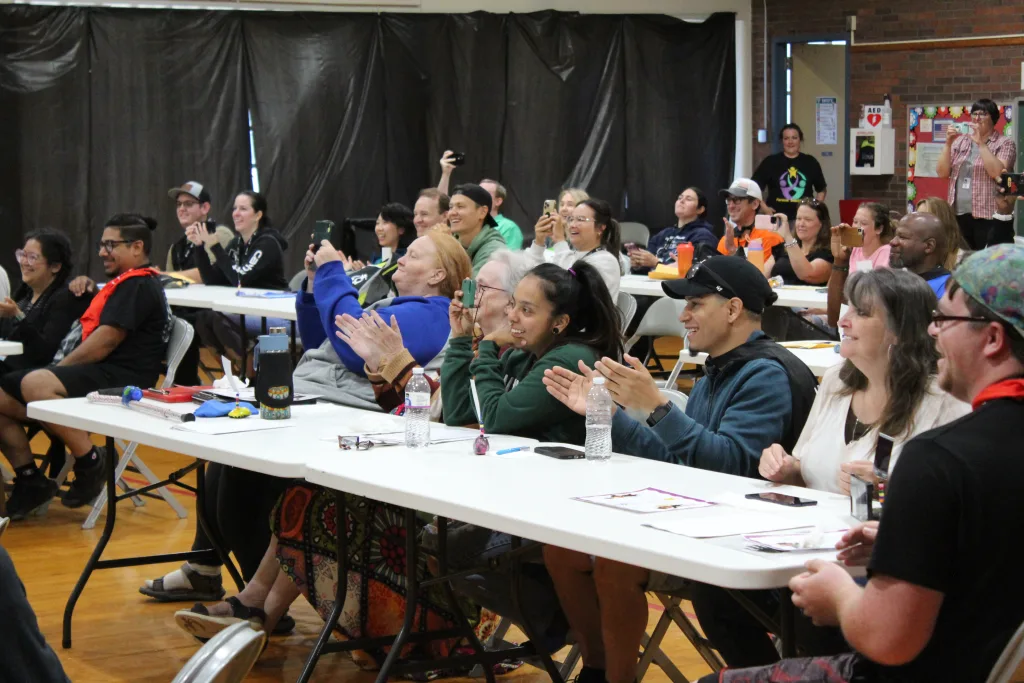
“The first thing that really hit a ‘wow’ moment for me was when we were doing the educational part about the hearing impairment, and they played that hearing loss simulation video. And hearing where she was, it was just surreal because you don’t really get it. You could try all you want to understand what your child’s going through, but you don’t get it unless you’re in it…” she said.
“It broke my heart. But it also made me understand her more… and see why things have been so hard for her.”
Mayra also found understanding for herself from both the Institute staff – many of whom have hearing loss themselves or are related to someone with hearing loss – and the other families.
“Everybody’s connected in some sort of way, and that’s why I feel like everybody here has such a passion for it,” Mayra said. “I’m lucky enough to take back these relationships that I have built with these parents because we might not be on the same journey, but we understand each other.”
Parent Megan Andresen and her 5-year-old son, Victor, are both deaf from Waardenburg syndrome.
“Coming into this I wanted to learn about my son’s behavior. Then I learned about implants and cued speech and different things, and it really opened my eyes.,” she said.
“The thing I think I’ll take away is as parents, whether we’re deaf or hearing, we have that same commonality because we do have deaf children, and it’s not different people in different groups,” she continued.
“It’s everybody really together, all coming here for the betterment of their children and to learn about their children.”
Sarah Dupuis’ daughter, Kimberly Pham, is 5 and was born with Down syndrome and mild to moderate hearing loss. As a special needs parent, Sarah said the opportunity to relate with other families is invaluable.
“Having a kid with special needs is so isolating. And to just be here with other families that face the same struggles… You’re sharing all of these stresses together, and it’s so cathartic,” she said.
Sarah and her husband, James Pham, also enjoyed the opportunity to immerse themselves in the classes and conversations without the distractions of day-to-day life back home.
“When you’re a parent of a child with special needs, you’re so overwhelmed all the time. And we just need resources, and it’s so hard to figure all those resources out by yourself,” Sarah said.
“You can come here, you can get the camaraderie with the other parents. You can learn about all kinds of things that you didn’t know about before. And it’s just so great. So, we’re really grateful for this.”
Inclusion and lifelong friendships
Lauren and Jonathan O’Brien traveled to the Institute with their daughter, Alannah, 7, and son, Josiah, 4.
Josiah has a genetic deletion on chromosome 15, which causes global delays with a bilateral hearing loss.
Alannah loved the sibling program and made a best friend with another girl in her group. Lauren and Jonathan also befriended the child’s parents.
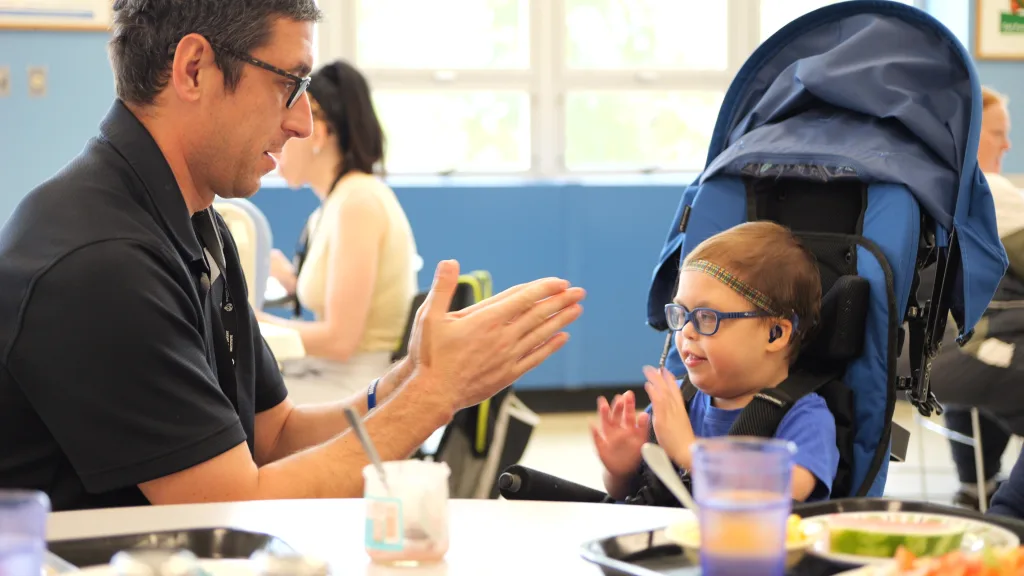
“I think the most important thing was for us to find a community because we are blessed to be in a really good school district with a deaf and hard-of-hearing community. But there’s not always kiddos that also have all their diagnoses going on. And so here, you not only have the Deaf culture, but there were other kiddos that had similarities to him cognitively,” Lauren said.
“It’s just been amazing for us to have the parent side of it and then to know that (Josiah)’s being seen by all of these top specialists in the field. And then (Alannah)’s having the time of her life with other siblings. It’s so special for all of us to be here together and to get this experience.”
Ramie Nauman’s daughter Alivia is 6 and has a fluctuating hearing loss along with other health conditions. They attended the Institute along with Alivia’s big sister, Malley, who is 19 and studying in the deaf and hard of hearing education program at Illinois State University
Alivia is mostly non-verbal and communicates through sign language. Up until attending the Institute, Ramie and Malley were the only ones who signed with Alivia outside of her school.
“She doesn’t have a lot of people to actually talk to all the time. So, we wanted for her to be able to talk to other kids and other adults. And we’ve heard about the school (ISD) and that everybody signs, and so, she’s been super excited,” Ramie said of preparing for the trip to ISD.
Alivia’s excitement only grew once she arrived on campus and could sign with everyone she met.
“I love to see her in her element, talking to the cook and talking to everybody. So, I think that’s been really fun to watch her be able to communicate with everybody here, which she’s never had before,” Ramie said.
“I feel like everything’s just way less scary because she knows, ‘OK, I can talk to anybody,’” Malley added.
Alivia’s Institute classmate Kingslee also benefited from that immediate sense of belonging, his grandmother Constance said.
Back home in the Collinsville area, Kingslee was the only deaf child in his class. Therefore, his exposure to sign language and communicating with other kids was minimal.
During the Institute, Kingslee formed fast friendships and didn’t want to leave his classroom.
“It’s like a family here. Like my grandmother always said, ‘It takes a village to raise a child.’ And I see this here is his village,” Constance said.
To families thinking about attending the Institute next year, Constance has a simple message.
“Come. If this is your state, come,” she said.
Learn more about the Institute
Visit our Facebook page to see an album of photographs from the the 2024 Institute.
In addition to DSCC, the following organizations supported this year’s program:
- Department of Human Services – Division of Rehabilitation Services
- Illinois School for the Deaf
- Illinois State Board of Education
- Illinois Department of Public Health
- Ann & Robert H. Lurie Children’s Hospital of Chicago
For more information about the Institute and how DSCC supports children with hearing loss, call (800) 322-3722 or email dsccinstitute@uic.edu.
Sensory-Friendly Hours and Programs for Families at the Illinois State Fair

DSCC team members will be at the fair’s Sensory Station on Aug. 8-11 and help during special sensory-friendly Sunflower Hours on Aug. 10
We understand the importance of having inclusive and accessible activities for children and families available in local communities. We are excited to help support the Illinois State Fair’s sensory-friendly efforts next month.
The 2024 Illinois State Fair is happening in Springfield from Aug. 8-18.
Our Division of Specialized Care for Children (DSCC) team members from central Illinois will help staff the fair’s Sensory Station. The fair is also offering sensory-friendly Sunflower Hours and other programming to make the fair a more comfortable and enjoyable experience for all.
Please read below for more details.
DSCC at the Sensory Station
Thursday, Aug. 8, to Sunday, Aug. 11
10 a.m. to 7 p.m. daily
Our DSCC team will be at the fair’s Sensory Station from Thursday, Aug. 8, through Sunday, Aug. 11.
The Sensory Station is inside the Emmerson Building, just off Main Street and Brian Raney Avenue in the center of the fairgrounds. It will be open from 10 a.m. to 7 p.m. daily. It is an air-conditioned, dedicated quiet zone with activities and resources to help visitors regroup and refocus.
The Sensory Station will have noise-canceling headphones, calming pods and sensory-friendly activities, such as a foam block pit, a stuffed animal “petting zoo,” a coloring station and more. These tools and activities are for children and adults who need help processing the sights, smells, noises and crowds at the fair.
Our DSCC team will also have a tent and table outside the Sensory Station on these four days. We will have coloring activities and information about our programs and services for families. Be sure to stop by and see us!
Sunflower Hours
Saturday, Aug. 10
9 a.m. to 12 p.m.
As part of its sensory-friendly efforts, the fair is also hosting Sunflower Hours on Saturday, Aug. 10, from 9 a.m. to 12 p.m. During this time, the fair will adjust certain programs and activities to create a softer, more calming environment for children and adults with sensory processing sensitivities.
The fair has Sunflower Hours stickers available for families to use during this timeframe. This sticker allows fair visitors with sensory sensitivities to enjoy select amusement rides for free during the Sunflower Hours. Riders must have the Sunflower Hours sticker and an adult and/or caregiver accompanying them.
DSCC has a limited number of stickers available for our program participants. If you are a DSCC participant family and would like us to send you a Sunflower Hours sticker, please email dscc@uic.edu with your name and your participant’s name. To allow enough time to mail stickers, please make your request by Aug. 5. We will send stickers on a first-come, first-served basis.
All families may visit the Sensory Station during the Sunflower Hours event to get more stickers. The stickers will be available while supplies last.
Conservation World, located at the fairgrounds’ Eighth Street entrance, will also host Sunflower Hours on Tuesday, Aug. 13, and Saturday, Aug. 17, from 9 to 10 a.m. Fairgoers can explore the great outdoors in a more peaceful and sensory-friendly setting during these times.
Social Story and Other Resources
The Illinois State Fair has a social story to help you plan your visit to this year’s event. It is a step-by-step guide to help parents and caregivers explain what to expect during a visit to the Illinois State Fair.
You can find the social story and more details about the Sensory Station, Sunflower Hours, the entertainment schedule and more on the Illinois State Fair website.
We are proud to help support greater accessibility and inclusion at the 2024 Illinois State Fair.
For more information about other sensory-friendly activities and events for children and families throughout Illinois, please visit our Events page and follow us on Facebook.
In-Depth Training Opportunity in Chicago for Families and Caregivers of Children with Complex Medical Needs
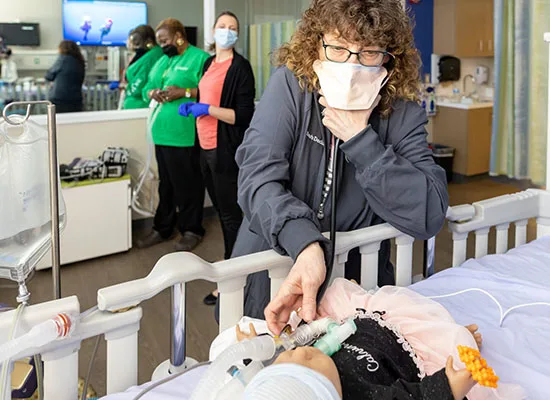
This free in-person training will take place July 24-25 at UIC’s Simulation and Integrative Learning Center in Chicago.
Registration is now open for a special in-person training program for the families and caregivers of children with complex medical needs.
This free two-day training will take place Wednesday, July 24, through Thursday, July 25, at the University of Illinois Chicago Simulation and Integrative Learning (SAIL) Center on the fifth floor at 1220 S. Wood St. in Chicago.
Families have expressed the need for more support for parents/caregivers of children with complex medical needs. We are excited to partner with Almost Home Kids to provide this valuable training opportunity. It will offer essential tools and knowledge to help you in your caregiving journey.
The training will be from 8 a.m. to 4:30 p.m. each day. The in-depth curriculum will include:
- Reducing the risk of infection
- Skin care
- Daily care of the child with a tracheostomy and ventilator
- Activity and movement
- Equipment and alarms
- Gastrostomy care and feeding
- Tracheostomy basics
- Respiratory assessment and interventions
- Ventilator training with hands-on practice
- Emergency preparedness
- Caregiver resiliency and well-being
- Simulation learning experience
You can also see the Caregiver Simulated Training flyer for more details.
Please sign up online to participate in the training. There is no cost to attend.
For more information, email connect@almosthomekids.org or contact Yolanda Rivera at yrivera@luriechildrens.org.
This training is part of our efforts to use federal funding from the American Rescue Plan Act to improve support and services for families of children with complex medical needs.
Almost Home Kids (AHK) provides a bridge from hospital to home through an innovative community-based care system for children with medical complexities. Its services include:
- Responding to the needs of families
- Training caregivers
- Advocating for accessibility and inclusion
- Educating healthcare professionals
Almost Home Kids has locations in Chicago, Naperville and Peoria.
Theater Helps DSCC Youth Find Her Purpose and Voice
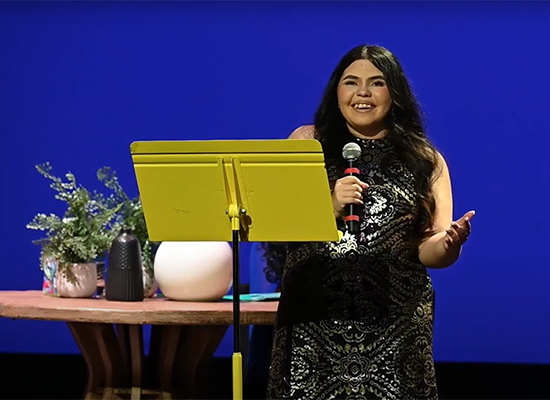
Acting allowed Izzy Gonzalez to break out of her shell and thrive while living with multiple disabilities
Izzy Gonzalez describes her childhood as “a storm” filled with severe illness, medical trauma and frightening diagnoses.
“As a child, I accepted that death was going to happen, and I just grew numb to that fact. I didn’t think I’d make it to high school,” recalled Izzy, now 20.
Izzy was born with VATER syndrome, a complex condition named for the body parts it affects: vertebrae, anus, trachea, esophagus and renal (kidney).
Her condition meant frequent surgeries, hospitalizations and appointments throughout her childhood.

The isolation and uncertainty took a toll, especially as Izzy entered middle school. But when she accepted an invitation to join a local theater program for youth with disabilities, everything changed.
“I was in a tunnel for the longest time, but I found my light. Theater is my light,” Izzy said.
Today, Izzy is a college student studying theater and planning for a promising future.
She recently gave a moving speech detailing her journey with disability during “That’s What She Said 2024.” The event was a live storytelling performance featuring local women from the Champaign-Urbana community.
Izzy stood on stage during the Feb. 24 performance and read a letter to herself called “Love, Izzy.” In the letter, she speaks to her younger self at 10 years old. At that time, she was in a medically induced coma for 30 days due to a severe infection of influenza B.
“Even though you have been in and out of the hospital since birth, this is the toughest moment your body will ever face…” Izzy read aloud.
“I still feel in my heart the fear and doubt that we would never see a real sunset ever again. I’m here to tell you that you will wake up and you’ll see so many more sunsets. We made it a whole two decades, so much longer than we ever thought possible… In true Izzy fashion, we defy all the odds.”
You can watch Izzy read her powerful letter in full in the video below:
Fear, doubt and isolation
Izzy was born with no anus and only one kidney, which grew bigger to compensate for her kidney that didn’t develop. She also has scoliosis and is missing some of her vertebrae. Doctors initially told her family she’d never be able to walk.
Izzy was also born with a tracheoesophageal fistula (TEF), which meant there was an abnormal connection, or “tunnel” as Izzy calls it, between her esophagus and trachea (windpipe). She experienced frequent vomiting, acid reflux and difficulty breathing until her TEF was officially diagnosed at age 12.
Izzy’s family moved to central Illinois from California after her birth so she could receive treatment at Carle Foundation Hospital in Urbana.
She enrolled with the University of Illinois Chicago’s Division of Specialized Care for Children (DSCC) in 2005.

DSCC helped coordinate Izzy’s medical appointments among many different specialists and arranged travel and hotel stays for her family.
Izzy underwent several major surgeries to correct her scoliosis and TEF, among others. She also experienced severe illnesses due to her weakened immune system.
“They knew my name in the pediatric ward and that was just the life I was living,” Izzy recalled.
This life meant Izzy missed many days of school, including all of sixth grade, due to medical reasons. The time away from her peers made it hard for Izzy to connect socially.
“I was gone from school so much, people in middle school thought I was a new kid,” Izzy said. “I was so much of an introvert because I didn’t know how to talk to anyone. I was that person who specifically chose to sit by myself at a lunch table at the back of a lunchroom.”
One day, Izzy’s mom asked if she’d like to try the Champaign Urbana Theatre Company’s Penguin Project.
The Penguin Project is a national program that provides a supportive environment for children with disabilities to explore their creative talents in a community theater experience. Youth with disabilities are the artists and “peer mentors” without disabilities join them on stage.
Not knowing what she was agreeing to, Izzy replied “yes.”
“I was bored with life so much that I was questioning my existence. I was questioning why I was here,” Izzy said, noting she had fallen into a deep depression and thought about self-harm.
Izzy felt she had nothing to lose.
“No limits”
The Penguin Project brought unexpected hope and unlocked a new passion and excitement within her.
“When I fell into The Penguin Project, I thought, ‘This is fun! I get to socialize with people and meet people like me,’” she said. “It’s an amazing program. You get to socialize with so many people that you wouldn’t have met otherwise, and that’s when I really found my people.”
Izzy was 12 when she joined The Penguin Project and has stayed involved with it ever since.
“Theater essentially saved my life and altered the course of my entire life. It altered the course of my future,” she said. “I got to enjoy life. I got to enjoy existing. I remember that first year, I was just enjoying being alive and that’s something I could never repay back in a million years. And that’s why I love The Penguin Project so much.”
Izzy started to act in other local theater productions. She calls being on stage and playing different characters a fun and freeing experience.
“In the theater, we get to be whatever we want. There are no limits,” she said.
Izzy received a nomination for a best up and coming actor award from the Champaign Urbana Theatre Company for her 2017 portrayal of Wally Webb in the play “Our Town.”
Izzy also participated in the Illinois Miss Amazing program. Miss Amazing provides opportunities for girls and women with disabilities to share their abilities and ambitions. In 2018, she became the Illinois Miss Amazing Junior Teen Queen.
As she prepared to graduate high school, Izzy knew she wanted to pursue theater in college.
She decided to attend Parkland College in Champaign, where she is studying theater arts and focusing on acting. Izzy recently completed her fourth semester and says she’s gained invaluable experience with the different theater production roles.
She hopes to eventually transfer to Millikin University in Decatur and earn her Bachelor of Fine Arts in theater. She also wants to become a makeup artist to help financially support her acting goals.
“A bright future”
Izzy currently lives at home with her parents due to her medical needs. She is working on becoming more independent so she can live on her own. After 19 years as a DSCC participant, she left the program in March 2024 as she prepares to receive adult services.
As she enters adulthood, Izzy enjoys raising awareness and advocating for people with disabilities.
She encourages other youth with disabilities and special healthcare needs to have fun as much as possible.
“That’s what always got me through my hospital stays. I had fun. I knew I was being watched medically, and I knew I was going through sicknesses, but I still had fun. I was still a child,” she said “And I’d say to the parents, make it fun for your child, just to take their minds off of what’s happening. Give them activities to do.”
Izzy also stresses the importance of a positive mindset.
“If you have a pessimistic mentality than nothing good is going to come of that, and you’ll just feel bad the entire time. If you have a more optimistic mentality, you’ll be able to cope better,” she said. “Always try to live in the moment, no matter what the situation is.”
As Izzy looks back on the “storm” of her childhood, she is thankful for the support she’s received along the way from her parents and her sister as well as DSCC.
She’s also incredibly proud of how far she’s come.
As she eloquently spoke to her 10-year-old self in her “Love, Izzy” letter: “One thing you’ll find out is the word ‘failure’ doesn’t seem to be in our medical vocabulary…” Izzy said.
“I can’t wait for you to experience everything that’s to come, and I can’t wait to experience what’s to come. I know that we will have a bright future.”
Former DSCC Participant Connects Youth with Hearing Loss to Services and Support
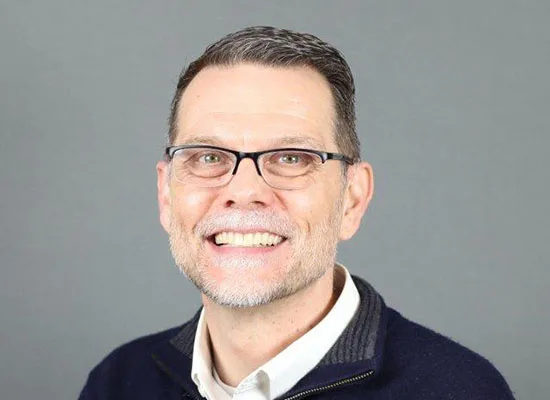
Todd Williams received Division of Specialized Care for Children (DSCC) support growing up and now leads the Evaluation Center at the Illinois School for the Deaf
Todd Williams has come full circle.
Todd, 53, grew up with hearing loss that wasn’t diagnosed until late in his childhood. He enrolled with the University of Illinois Chicago’s Division of Specialized Care for Children (DSCC) and a new world of access opened to him.
That access and support led him to a career that’s opening doors and opportunities for countless other Illinois families of children who are deaf or hard of hearing.
Todd is currently the Evaluation Center Director at the Illinois School for the Deaf (ISD). In this role, he helps school children with hearing impairments all over Illinois receive the right assessment, enrichment and intervention services.
Todd also speaks with parents during the annual Institute for Parents of Preschool Children Who Are Deaf or Hard of Hearing on the ISD campus in Jacksonville each June. The Institute is a partnership of DSCC, the Illinois School for the Deaf and other sponsors. It provides valuable education, resources and connections to families of young children with hearing loss in Illinois.
“My involvement with Parent Institute is just to be an advocate and tell them… ‘I’m a client of this program. So, please take advantage of the services that are out there,’” he said.
“The services don’t just come to you. You have to make an effort.”
Todd explains more about how he helps empower and inspire Institute families in the video below:
Todd says he is thankful for the support his family received when they needed it most.
He was in the sixth grade when his language arts teacher noticed something was “off” and mentioned it to his mother.
“Sometimes you don’t know what you don’t know until you do,” Todd said. “Once my hearing was tested, they couldn’t figure out why I was functioning so well! I remember being able to read lips. Even though I might not hear the bell ring, I could see what the other kids were doing and follow along.”
Todd said his hearing loss was mild to moderate at that time, and school wasn’t a struggle.
He was then diagnosed with bilateral sensorineural hearing loss, a condition where there is damage to the tiny hair cells in the inner ear (known as stereocilia) or to the nerve pathways that lead from your inner ear to the brain.
“We don’t know what caused my hearing loss, but I was sick a lot as a young child with allergies and ear infections,” Todd said. “I must have had hearing at some point because I know what letters and other sounds should sound like, so my speech wasn’t greatly impacted.”
He attended public school during the recession of the 1980s, and money was tight for his family as they started researching how to best support his hearing loss.
“The economic situation was terrible, and probably everybody in town was getting or needed some sort of assistance,” Todd explained.
His mom attended a town meeting about available services, and a woman told her about DSCC.
“That was back when DSCC was called the Division of Services for Crippled Children,” Todd said. “Thankfully, the name has changed, inclusion is growing, and the woman impressed on my mom that DSCC could help.”
For 87 years, DSCC has partnered with Illinois families to help connect children with special healthcare needs – including hearing loss – to the services and resources necessary to reach their full potential.
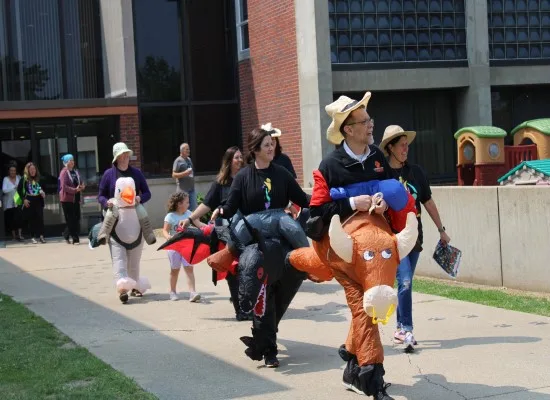
Thanks to DSCC, Todd began to see audiologists and providers who could help. He also received financial support for the cost of his first hearing aid. (DSCC can provide financial assistance for some eligible medical expenses when families meet certain income guidelines.)
“Having my hearing aid was access. We would have found the money somewhere, but it would have been an incredible hardship,” Todd said. “It was no coincidence that things fell in line. With DSCC it was amazing, perfect timing. That’s the beauty of it.”
Later, when his family moved, DSCC went with them.
“No matter where you go in Illinois, DSCC is there,” Todd said. “They were there to help my family with appointments and hearing aids. I got a second hearing aid when I was a sophomore and getting closer to aging out of the program.”
Todd later started planning for college. He took a placement test at John A. Logan Community College in Carterville. While there, a gentleman saw his hearing aids and gave him contact information for the Division of Rehabilitation Services (DRS or DORS) program.
“DORS helps individuals with disabilities become independent, productive citizens. They helped me through school, and I got my master’s at no cost,” Todd said.
He attended Illinois State University and earned a bachelor’s degree in teaching deaf and hard-of-hearing students. He later earned his master’s degree in counseling as well.
Over the years, Todd has worked in education and counseling and served as a deaf/hard of hearing consultant for the state. He also progressed from being hard of hearing to deaf. Todd now has cochlear implants, which unlocked a new world of sounds for him.
He became ISD’s Evaluation Center Director in December 2020. He says he enjoys empowering families and serving as a role model for youth with hearing loss.
“I had a little kid come up to me in the dining hall who was all excited because I had two implants just like him,” Todd said. “So, there’s the role model part, too, which is important for our kids to see that adults do walk around with these (implants), and they are successful.”
Todd encourages families of young children with hearing loss to attend the Institute and learn how ISD, DSCC and other state programs can benefit their children and families.
“Don’t miss out on a chance when you can really gain the most comprehensive evaluation for your child, and the resource list will be phenomenal,” Todd said.
“You have the ability to ask questions, to get questions answered that maybe you’re not feeling comfortable with asking in another setting. That’s what we’re here for. We’re here to answer questions and become a resource for you so the programing for your child can be the best that it can be. That’s our goal.”
DSCC Earns Case Management Accreditation
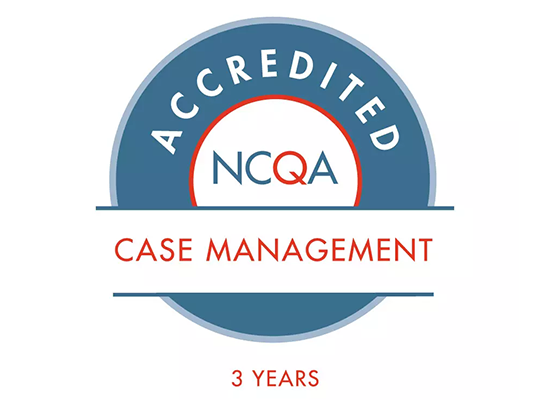
The prestigious achievement recognizes our commitment to providing the highest quality service and support to our participant families.
We are proud to share a significant milestone for our University of Illinois Chicago’s Division of Specialized Care for Children (DSCC) team.
DSCC has earned Case Management Accreditation from the National Committee for Quality Assurance (NCQA). This achievement recognizes our commitment to providing exceptional care coordination and related support to our participant families.
NCQA accreditation is widely known as a symbol of quality and shows an organization’s dedication to meeting high performance measures and continuous improvement.
“We are thrilled to receive NCQA Case Management Accreditation, which highlights the strength and person-centered focus of our care coordination services,” said DSCC Executive Director Thomas F. Jerkovitz.
“This achievement reflects the great work of our entire DSCC team to improve operations and strengthen how we partner, help and connect with families throughout the state. We hope our participant families can feel confident and empowered, knowing they have a strong support system focused on improving their quality of life.”
DSCC provides care coordination to Illinois children and youth with special healthcare needs and their families through several programs.
We tailor our care coordination to each family’s unique needs and goals. We partner with them to develop a care plan focused on a child’s medial, social, behavioral, educational and financial needs.
Our care coordination can include finding specialized medical care, helping families understand their child’s diagnosis and medical treatment plan, explaining insurance benefits and attending school meetings.
In 2021, DSCC’s leadership set a strategic goal to work toward NCQA accreditation. Our team members have worked for more than three years to achieve this major recognition.
NCQA purposely sets its accreditation standards high to encourage organizations to continuously enhance their quality. The standards aim to help organizations achieve the highest level of performance possible and create an environment of continuous improvement.
The NCQA Case Management Accreditation Program reviewed our care coordination and entire organization against the following standards:
- Program Description: The organization uses up-to-date evidence-based information to develop its case management program and regularly updates the program with relevant findings and information.
- Patient Identification and Assessment: The organization systematically identifies patients who qualify for its programs.
- Care Planning: The organization coordinates services for patients through the development of individualized care plans.
- Care Monitoring: The organization has systems in place to support case management activities and monitors individualized care plans.
- Care Transitions: The organization has a process to manage care transitions, identify problems that could cause care transitions and prevent unplanned transitions, when possible.
- Measurement and Quality Improvement: At least annually, the organization measures patient satisfaction, program effectiveness and participation rates.
- Staffing, Training and Verification: The organization defines staffing needs, provides staff with ongoing training and oversight and verifies healthcare staff credentials.
- Rights and Responsibilities: The organization communicates its commitment to the rights of patients and its expectations of patients’ responsibilities.
“Case Management Accreditation moves us closer to measuring quality across population health management initiatives,” said NCQA President Margaret E. O’Kane. “Not only does it add value to existing quality improvement efforts; it also demonstrates an organization’s commitment to the highest degree of improving the quality of their patients’ care.”
A big congratulations and thank you to everyone who helped us reach this milestone!
NCQA is a private, nonprofit organization dedicated to improving health care quality. NCQA accredits and certifies a wide range of health care organizations. It also recognizes clinicians and practices in key areas of performance. NCQA’s Healthcare Effectiveness Data and Information Set (HEDIS®) is the most widely used performance measurement tool in health care. NCQA’s website (ncqa.org) contains information to help consumers, employers and others make more-informed health care choices. NCQA can be found online at ncqa.org, on Twitter @ncqa, on Facebook at facebook.com/NCQA.org/ and on LinkedIn at linkedin.com/company/ncqa.
Important DSCC Contact Information Updates

Participant families, please save our (800) 322-3722 number to your contact list!
As part of our commitment to serving our participant families, we want to ensure you can easily reach us whenever you need help or have questions.
Please take a moment to save our toll-free (800) number to your contacts list: (800) 322-3722.
This step will help prevent our calls from being mistaken as spam. It will also help ensure you receive important updates and support from your care coordination team.
Our (800) 322-3722 number remains the simplest and fastest way to reach anyone at the Division of Specialized Care for Children (DSCC).
You can use this number to dial your Care Coordinator’s direct extension or have our Customer Service Representatives connect you with the right person or team.
Saving our number to your phone’s contact list can help improve the process in several ways:
- Have quicker access – Having our number readily available in your contacts can save time when you need assistance or have questions.
- Avoid spam filters – Saving our number reduces the likelihood our calls will be flagged as spam.
- Communicate more seamlessly – Having one number to call helps ensure smoother communication whenever you need support or would like to share feedback.
You may also reach us electronically through our general dscc@uic.edu email address or our Contact Us or Request a Callback forms on our website.
You can also use our new DSCC Family Portal to easily share information and communicate with your care coordination team. You can use the Family Portal to:
- Send messages
- Sign documents
- View important letters
- See a list of providers and much more
To access the portal, visit https://go.uic.edu/DSCCFamilyPortal.
To help you get started, we’ve created several tip sheets and videos for how to use the Family Portal. You can find these resources on our website at https://dscc.uic.edu/dscc-family-portal/.
If you have trouble accessing the Family Portal or need other support, please email dsccexternalhelp@uic.edu.
You can also speak with your Care Coordinator if you need to update your communication preferences.
Our office hours are 8 a.m. to 4:30 p.m. Please talk to your Care Coordinator if you need to speak outside of business hours.
We want to ensure our care coordination teams are easily accessible for everyone in our programs.
Thank you for your cooperation and partnership!
DSCC Creates New Tool to Improve Families’ Access to Available In-Home Nursing
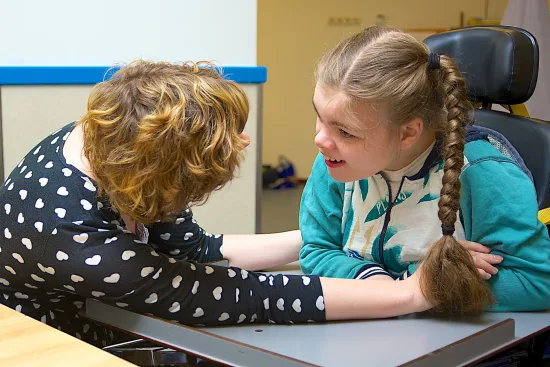
NurseNet helps Home Care Program families connect with nursing agencies to find available nurses in your area.
Finding in-home nurses can be challenging for many families caring for children and adults with complex medical needs.
We’ve created a new tool to help you find and connect with available nursing agencies in your area.
NurseNet aims to bridge the gap between Illinois families who need nursing and home health nursing agencies with available nurses.
Families of individuals enrolled in the Home Care Program can use NurseNet to share their nursing needs. Nursing agencies that are enrolled with the Division of Specialized Care for Children (DSCC) can share information about where nurses are available.
This information can help your family find suitable nursing care. It can also help nursing agencies identify opportunities to serve families.
Anyone can use NurseNet to search for general nursing opportunities across the state.
The search is set up for families and nursing agencies to find and share what they need easily. As a family enrolled in the Home Care Program, you can log in to NurseNet and enter your nursing needs.
Nursing agencies can see this information and contact your family within NurseNet if they have a potential nursing opportunity in your area that matches your child’s care needs. You can also use NurseNet to see where nursing opportunities are available throughout Illinois.
Nursing agencies enrolled with DSCC can log in to NurseNet and enter all areas of the state where they have nurses available. Nursing agencies can also see where families have nursing needs and connect with those families to provide nursing care.
Visit the NurseNet page on our website to learn about how NurseNet can help both families and nursing agencies. You can also find helpful videos and guides on how to use NurseNet.
We understand the search for in-home nursing can be frustrating and overwhelming. That’s why we created this tool to help you share your nursing needs and connect with nursing agencies with available nurses.
We are excited to offer this tool to help provide nursing connections to our participant families enrolled in the Home Care Program!
New Youth Advisory Council for Teens and Young Adults With Special Healthcare Needs

An opportunity for youth to help improve transition support and make a difference!
Youth with special healthcare needs should have a big role in shaping their future and helping improve support for others.
We want to hear from teens and young adults about what’s important and helpful to them as they plan for the future. Our new Youth Advisory Council is a great opportunity for them to share their input and make a difference.
The Youth Advisory Council (YAC) is a diverse, youth-driven group that aims to develop more youth-focused ways to help individuals and families with transition planning, resources and services.
The YAC’s goal is to support positive outcomes in adulthood for all Illinois youth with special healthcare needs in the areas of:
- Employment
- Health care
- Independence
- Quality of life
The YAC’s role is to:
- Bring a different and personal perspective on issues important to youth.
- Partner with the Division of Specialized Care for Children (DSCC) to help develop more youth-focused methods to enhance care coordination.
- Develop strategies to improve communication between youth/young adults and older adults.
Members participate in four virtual meetings per year.
Who is Eligible to Join the YAC?
The YAC is open to youth with special healthcare needs who are:
- Ages 15 to 24
- Living in Illinois
- Planning for the transition to adulthood in the areas of education, health care, employment and home and community-based support
Youth do not have to be a DSCC participant to join the council.
How to Join and Learn More
Members must complete an online application to join. (The application is also available in Spanish.)
Visit our Youth Advisory Council page for more information and answers to frequently asked questions.
You can also see the YAC flyer for more details:
If you have questions, please contact Claire Cook, DSCC’s Title V Program Transition Specialist, at clairer3@uic.edu or (800) 322-3722, ext. 21812.
Inclusive Summer Camp Programs for All Ages

Our list of camps and activities all over Illinois can help you find the right fit for your child
Summer and the long break from school are right around the corner!
The good news is there are a variety of programs throughout the state to help keep your children engaged and learning.
We’ve gathered a list of day and overnight camps as well as virtual programs for youth of all ages with disabilities and special healthcare needs.
Does your child want to make new friends? Develop new skills? Meet others with their same condition or become more independent?
Our 2024 summer camp list can help you find the right fit.
There are several ways to search the camp opportunities on our website:
- Use the search box and filter option on our Events page to search for camps and other related keywords and locations
- View our full 2024 summer camp list
- Use our Events Calendar view to see summer camps listed by date
These camps are accessible and inclusive for a variety of ages and needs, including many of our program’s eligible medical conditions.
Please note that program deadlines vary, and some camps fill up quickly.
Know of a good summer camp opportunity to add to our list?
Send us the details at dscc@uic.edu. We’ll continue to update our list of camps and activities, so please check back often!



